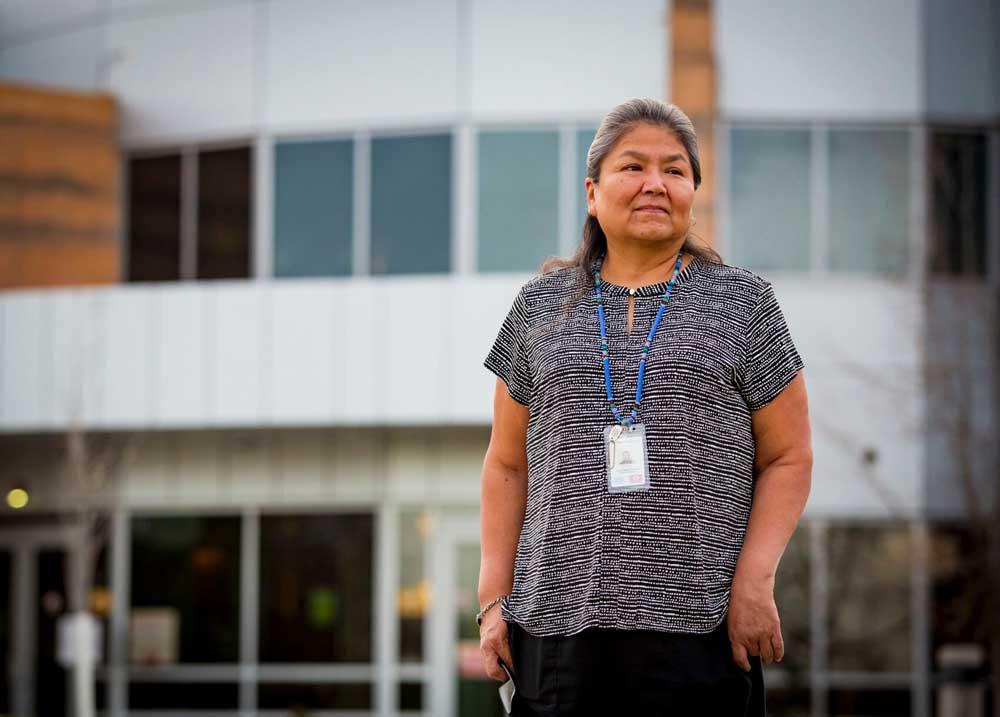Survey: Sexual violence pervasive, underreported on Umatilla Indian Reservation
Published 7:30 am Friday, November 19, 2021

- Desireé Coyote, an abuse survivor, advocate and enrolled member of the Confederated Tribes of the Umatilla Indian Reservation, stands outside the Nixyaawii Governance Center in Mission on Wednesday. Coyote manages Tribal Family Violence Services and helped conduct a study of sexual violence on the reservation.
MISSION — Survivors of sexual violence on the Umatilla Indian Reservation don’t trust authorities, fear retaliation if they talk and fear friends and family won’t believe them or would shame them.
Those are part of the findings of a survey Tribal Family Violence Services and its manager conducted for a year-and-a-half with 86 community members and employees of the Confederated Tribes of the Umatilla Indian Reservation.
The information-gathering efforts found more than half of respondents are “very aware” of sexual violence occurring in their community, and more than a third said the violence has become worse over time.
More than 90% of survey respondents are women and enrolled Confederated Tribes of the Umatilla Indian Reservation members.
“Rape, in all its brutal forms, has been occurring since before boarding schools, since before Columbus arrived, and has just increased since then against Indigenous people of this land,” said Desireé Coyote, an abuse survivor, advocate and enrolled tribal member. She manages Family Violence Services, which is dedicated to helping survivors of violence.
“We, the United States, didn’t address it back then,” she said. “We’re still not addressing it today. We’re still not addressing the violence against Indian women today, as well as they do for everybody else.”
Survey’s findings
The initial findings show nearly 60% of respondents believe sexual violence or domestic violence survivors either are underserved or inadequately served. Nearly 70% said the same for child sexual abuse survivors.
And the survey illuminates a general reluctance to report such crimes to authorities.
More than 60% of respondents said sexual violence survivors would not report such crimes to law enforcement or health services because of a lack of trust, awareness or privacy.
Nearly 80% said they wouldn’t report because they would not be believed, and 88% said they wouldn’t because they fear retaliation, the study showed.
What’s more, the findings show more than 80% of respondents said victims would not report sexual violence to their family and friends, fearing gossip, retaliation, shame or that they would not be believed.
“When we can’t trust the people who serve us … then when are we going to be able to talk about what hurts us?” Coyote said, adding: “If we can’t trust each other, then we’ll fail.”
The report comes ahead of an event called “The Voices and Perspectives of the Tribal Community: What we Know About Sexual Violence,” where officials and researchers will disclose the report’s findings in full. The public event is planned Friday, Nov. 19, from 8 a.m. to 4:30 p.m. at Wildhorse Resort & Casino.
The event will showcase a variety of researchers and community leaders who will speak about how sexual violence impacts tribal land. It will also include time for community members to come forward and speak about what solutions they would like to see, Coyote said.
Survey underscores epidemic
The survey findings underscore a national trend that some Indigenous advocates have come to call an epidemic — Native American women are disproportionately victims of violence.
The Centers for Disease Control and Prevention says nearly half of all Native American women have suffered physical or sexual violence. A separate Justice Department report found that 1 in 3 Native American women have been raped or experienced an attempted rape — more than twice the national average.
But that data is limited, as layers of bureaucratic and jurisdictional problems have made it nearly impossible to track the full extent of violence on tribal land.
For years, those challenges included disagreements among local or federal agencies concerning who should investigate, allowing countless victims and perpetrators to slip through the cracks. And for years, Coyote said, those problems have been prevalent on the Umatilla Indian Reservation.
The Umatilla tribal court was one of the first tribes to participate in a pilot program to prosecute non-Indians for domestic violence against Native Americans on the reservation. Before then, many non-Native perpetrators could commit acts of violence on the reservation and get away with it, Coyote said.
In 2013, the Violence Against Women Act was reauthorized, bringing forth new provisions that address violence against Native women by restoring tribal jurisdiction over non-Native perpetrators of domestic violence on tribal land. A year later, the Confederated Tribes of the Umatilla Indian Reservation was one of only three tribes initially allowed to participate in the program in the U.S.
Survey pushes for improvements
The latest survey from Family Violence Services is part of Coyote and the tribes’ broader effort to raise awareness and encourage survivors to have their voices heard in order to improve services on the reservation.
The survey states a variety of services are in need of improvement to help survivors: mental health services, housing, drug and alcohol treatment, sex offender accountability and a nurse examiner for sexual assault survivors. It also advocates for a wide array of training and technical assistance.
Coyote said improvements have been made, but much is yet to be done to ensure survivors receive ample help. Coyote, who has dedicated her life to helping Indigenous survivors of violence, said she hopes the survey and the upcoming event will spur new solutions in the community.
“I’m hoping people will remove the blinders, speak up and be active,” Coyote said. “Not just community members, but systems.”
Recalling the focus groups she attended, Coyote said one survivor’s statement sticks in her mind:
“The silent are screaming.”
If you are a victim of intimate partner violence, intimidation, sexual violence, rape, elder abuse, teen dating violence or stalking, you can reach Family Violence Service’s 24-hour hotline at 541-240-4171.








